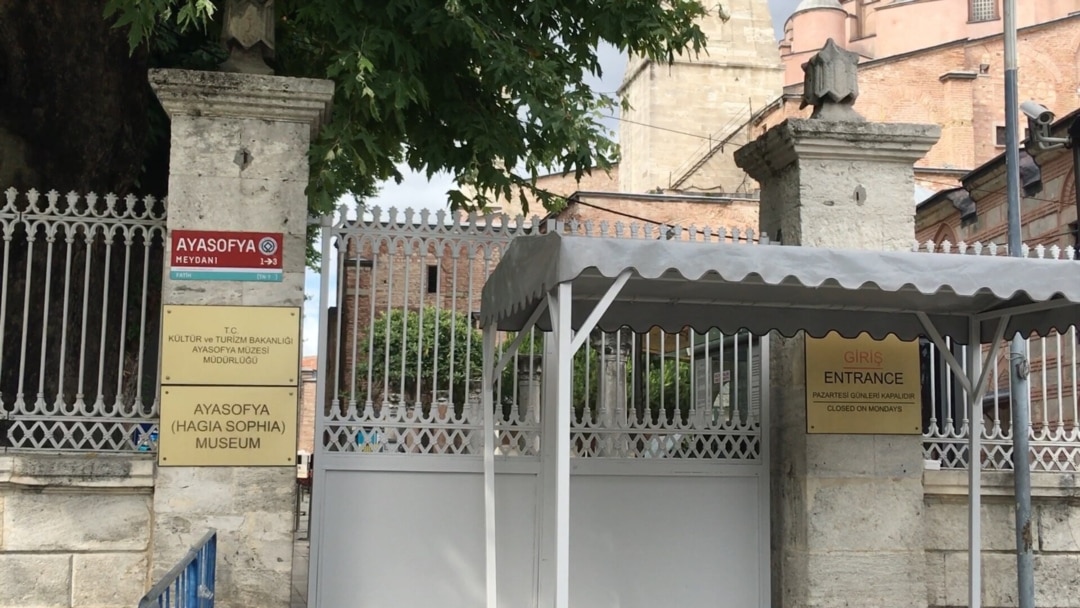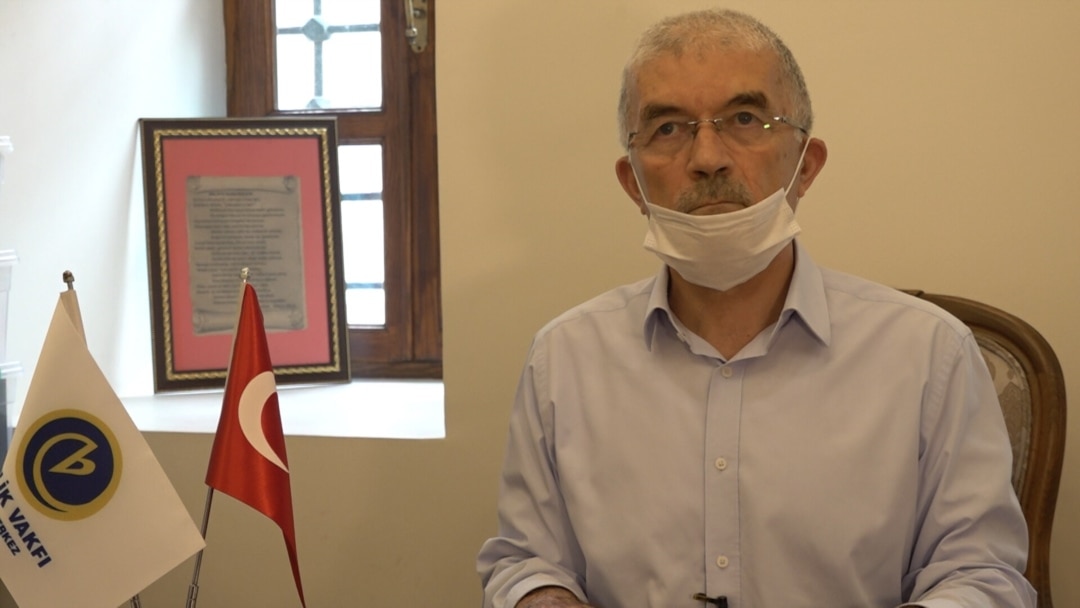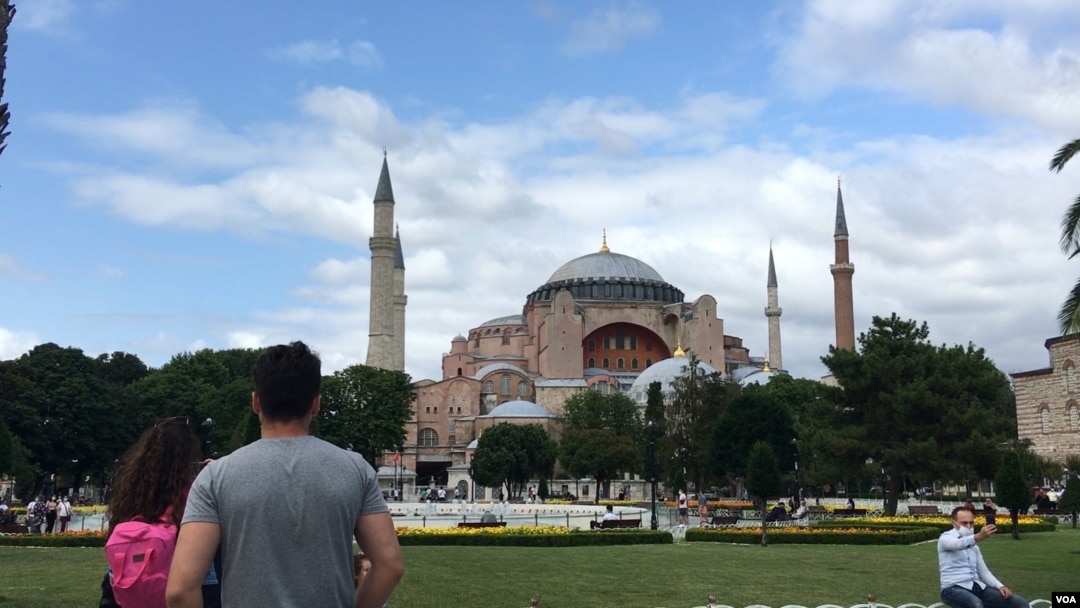Turkish President Recep Tayyip Erdogan faces a growing backlash over his plans to turn Istanbul's iconic Hagia Sophia into a mosque.
The sixth-century Byzantine cathedral served as a mosque for 400 years before it was turned into a museum. More recently, it was declared a UNESCO World Heritage site in 1985.
Throughout the Hagia Sophia's 1,500-year history, its status has reflected the rise and fall of empires.
For nearly a millennium, the Hagia Sophia was eastern Christendom's greatest church. But in 1453 when Ottoman forces led by Sultan Fatih Mehmet conquered Constantinople, now Istanbul, his first act on entering the city was to pray in the cathedral and declare it a mosque.

In 1935, the founders of Turkey’s secular state turned the Hagia Sophia from a mosque into a museum as a symbol of modernity. (Dorian Jones/VOA)
In 1935, the founder of the modern Turkish republic, Mustafa Kemal Ataturk, turned the building into a museum symbolizing Turkey’s new status as a modern Western-style secular society. For 80 years, symbols of Islam and Christianity have harmoniously coexisted in this architectural marvel, once the largest building in the Byzantine empire.
Now, Erdogan is vowing to turn it back into a mosque.
Political interests
The Hagia Sophia's reconversion has long been a demand of the most ardent elements of Erdogan’s religious and nationalist base.
Last year's celebration of the Muslim conquest of the city saw hundreds of people praying outside the Hagia Sophia as part of a campaign to convert the building into a mosque.
Turkey's Birlik Foundation says more 2 million people have signed its petition calling for the Hagia Sophia to be made a mosque again.

Mehmet Alacaci, chief executive of Turkey’s Birlik Foundation, says the campaign to turn Hagia Sophia into a mosque is about reclaiming an important symbol of religious identity. (Dorian Jones/VOA)
"The question of its reopening to prayers has been in the heart of Muslims since it was closed to prayers and converted to a museum," said Mehmet Alacaci, chief trustee of the Birlik Foundation.
"The will and bequest of Fatih Sultan Mehmet, who conquered this city, is to have Hagia Sophia as a mosque. And we are in the spirit of taking back this inheritance and property of our ancestors," he added.
Erdogan has long flirted with the Hagia Sophia's conversion through his nearly 20 years in power, first as a prime minister and then as president.
"You know, they changed Hagia Sophia from mosque to museum a while ago. God willing, after the election, we will change Hagia Sophia's name from museum to mosque,” Erdogan said last year during a campaign rally ahead of local elections.
With the economy hard hit by the COVID-19 pandemic and the president’s ruling AKP Party poll ratings sliding, Erdogan needs to consolidate his base quickly and appears ready to push ahead with Hagia Sophia’s conversion.
Professor Istar Gozaydin, an expert on religion and the state, says the move to convert the Hagia Sophia to a mosque is an effort to consolidate the president's religious and nationalist base amid sliding support for his AKP Party. (Dorian Jones/VOA)
"The AKP is suffering in current times. In order to change the agenda in Turkey, they need a [new] subject to be worked on," said Istar Gozaydin, a professor and expert on religion and the state. "To convert it into a mosque apparently means something for the grassroots of AKP in Turkey and supporters abroad," she said.
But the gesture that Erdogan is offering to his base is coming at a high price.
Protests
"The conversion of Hagia Sophia into a mosque will disappoint millions of Christians around the world," warned the leader of the 300 million Orthodox Christians, Ecumenical Patriarch Bartholomew.
"The Hagia Sophia, which, due to its sacredness, is a vital center where East is embraced with the West, will fracture these two worlds," he added.
Bartholomew, who is based in Istanbul, aware of the delicate situation facing Turkey's small remaining Orthodox community, usually refrains from openly criticizing Erdogan.
The Ecumenical Patriarchate is receiving growing international support in its fight to avert a transformation of the landmark. The United States urged Ankara not to change the Hagia Sophia's status.
"We urge the government of Turkey to continue to maintain the Hagia Sophia as a museum, as an exemplar of its commitment to respect the faith traditions and diverse history that contributed to the Republic of Turkey, and to ensure it remains accessible to all," Secretary of State Mike Pompeo said in a statement last Wednesday.
Russia, despite its competing interests in Turkey, voiced concerns similar to those of the United States.
A nationwide petition calling for the Hagia Sophia to be turned into mosque has been launched. In Sanliurfa, people queue to add their names. (Birlik Foundation)
"Hagia Sophia, in addition to its tourism value, has a very deep sacred spiritual value," Kremlin spokesman Dmitry Peskov said this week.
Protests have also come from the government of neighboring Greece.
Erdogan defiant
The Turkish leader has dismissed all international criticism.
"Accusations against our country about Hagia Sophia directly target our sovereign rights," shot back Erdogan last week.
A recent opinion poll found most Turkish respondents backed the Hagia Sophia's conversion. However, the same survey also recorded a larger number of people viewing the issue as an attempt to distract voters from the current economic malaise.
There are now growing concerns for the Hagia Sophia's magnificent interior. Large mosaics depicting Christ, the Virgin Mary and Byzantium rulers adorn the massive walls and ceilings of the onetime cathedral.
"It's not practical, and it's illogical to convert into a mosque again," said professor Zeynep Ahunbay, who spent 25 years working on the Hagia Sophia's restoration and preservation.
She alluded to Islam’s traditional ban on divine images.
"When you pray, you don't want to be in the presence of some images, which can be considered like icons, et cetera. It is against the Islamic creed," she said.
"And what will happen? How will [they] be covered during prayers? Can you imagine a curtain hanging over the mosaics? I think it's not acceptable."
WATCH: Erdogan Pushes to Reconvert Hagia Sophia into Mosque
Your browser doesn’t support HTML5
Erdogan Pushes to Reconvert Hagia Sophia into Mosque
The judges who sit on Turkey’s high court, who invariably accommodate Erdogan's wishes, are due in the coming days to rule on whether a conversion of the building would be legal. Turkish newspaper columnists close to Erdogan are predicting the court will decide in the president’s favor.
There is a growing expectation in Turkey that it may not be long before Hagia Sophia's minarets rejoin the chorus of surrounding mosques’ calls to prayer.


